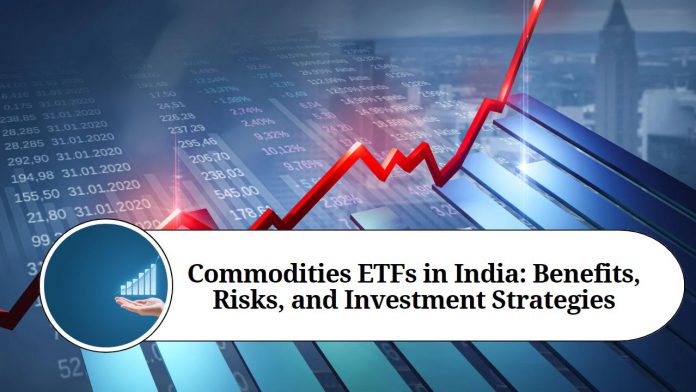Commodities ETFs in India: An Introduction
Commodities have been a popular asset class for investors for many years. They are widely used as a hedge against inflation, currency fluctuations, and geopolitical risks. With the growth of the Indian economy, the demand for commodities has been on the rise. In recent years, many investors have turned to commodities ETFs as a way to invest in the asset class. In this blog, we will explore what commodities ETFs are and how they work in India.
What are Commodities ETFs?
Commodities ETFs are exchange-traded funds that invest in commodities. These funds hold a variety of commodities, such as gold, silver, crude oil, natural gas, and agricultural products. They are designed to provide investors with exposure to the underlying commodity prices without actually holding the physical commodity.
Commodities ETFs in India
In India, there are several commodities ETFs available for investors. These funds invest in a variety of commodities, such as gold, silver, crude oil, natural gas, and agricultural products. Some of the popular commodities ETFs in India are:
- UTI Gold Exchange Traded Fund
- HDFC Gold Exchange Traded Fund
- Kotak Gold Exchange Traded Fund
- Nippon India ETF Gold BeES
- ICICI Prudential Gold ETF
How do Commodities ETFs work?
Commodities ETFs work by tracking the price movements of the underlying commodity. For example, if an ETF invests in gold, the price of the ETF will move in line with the price of gold. The ETF will hold physical gold or gold futures contracts to track the price of the commodity.
Commodities ETFs can be bought and sold on the stock exchange, just like stocks. They are listed and traded on the National Stock Exchange (NSE) and the Bombay Stock Exchange (BSE).
Advantages of investing in Commodities ETFs
- Diversification: Commodities ETFs provide diversification benefits to the investors by investing in a variety of commodities. This can help in reducing the overall risk of the portfolio.
- Liquidity: Commodities ETFs are listed and traded on the stock exchange, making them highly liquid. Investors can buy and sell these ETFs at any time during the trading hours.
- Low investment amount: Commodities ETFs allow investors to invest in commodities with a low investment amount. This makes it accessible to a wide range of investors.
- No storage and transportation costs: Unlike physical commodities, commodities ETFs do not have any storage and transportation costs. This can help in reducing the overall cost of investing in commodities.
Risks of investing in Commodities ETFs
- Market risks: Commodities ETFs are subject to market risks, just like any other asset class. The prices of commodities can be volatile, which can lead to significant fluctuations in the ETF’s price.
- Currency risks: Commodities are often priced in US dollars. This means that if the rupee depreciates against the dollar, the returns on the ETF can be lower.
- Regulatory risks: Changes in regulations can impact the performance of commodities ETFs. For example, changes in import-export policies can impact the prices of certain commodities.
Commodities ETFs have become increasingly popular in India in recent years. One of the reasons for their popularity is their ability to provide investors with a way to invest in the commodities market without having to take physical delivery of the commodities. This eliminates the need for storage and transportation costs associated with holding physical commodities.
Another reason for the popularity of commodities ETFs is their ability to provide diversification benefits to investors. These funds invest in a variety of commodities, which can help reduce the overall risk of the portfolio. Commodities are often considered a good hedge against inflation, as their prices tend to rise when inflation is high. This can help protect the investor’s purchasing power.
Gold is one of the most popular commodities among investors. Gold ETFs invest in physical gold or gold futures contracts. Gold has traditionally been seen as a safe-haven asset and a store of value. During times of economic uncertainty, investors tend to flock to gold as a safe haven, which can drive up the price of the metal. Gold ETFs have become an easy way for investors to gain exposure to gold without having to buy physical gold.
Crude oil is another popular commodity among investors. Crude oil ETFs invest in crude oil futures contracts. The price of crude oil is driven by several factors, including supply and demand, geopolitical tensions, and global economic growth. Crude oil prices can be volatile, which can lead to significant fluctuations in the price of crude oil ETFs.
Agricultural commodities, such as wheat, corn, and soybeans, are also popular among investors. Agricultural commodities ETFs invest in agricultural futures contracts. The prices of agricultural commodities are driven by factors such as weather patterns, global demand, and supply chain disruptions. Investing in agricultural commodities can provide diversification benefits to the investor, as these commodities are often not correlated with other asset classes.
Conclusion
In conclusion, commodities ETFs can provide investors with a way to invest in the commodities market without having to take physical delivery of the commodities. They offer diversification, liquidity, and low investment amount, making them an attractive investment option. However, investors should be aware of the risks associated with these ETFs, such as market risks, currency risks, and regulatory risks. As with any investment, it is important to do your research and consult with a financial advisor before investing in commodities ETFs.
Other Related Blogs: Section 144B Income Tax Act
Frequently Asked Questions (FAQs)
Q: What is a commodities ETF?
A: A commodities ETF is an exchange-traded fund that invests in commodities such as precious metals, crude oil, agricultural products, and other natural resources.
Q: How does a commodities ETF work?
A: A commodities ETF invests in futures contracts or physical commodities to track the price movements of the underlying commodity. The ETF’s value is based on the price of the underlying commodity.
Q: What are the advantages of investing in commodities ETFs?
A: Investing in commodities ETFs can provide diversification benefits to a portfolio, act as a hedge against inflation, and offer exposure to a variety of commodities without the need for physical delivery.
Q: What are the risks associated with investing in commodities ETFs?
A: Commodities ETFs can be subject to market risks, currency risks, and regulatory risks. Additionally, the prices of commodities can be volatile, which can lead to significant fluctuations in the value of the ETF.
Q: What commodities are included in commodities ETFs?
A: Commodities ETFs can invest in a variety of commodities, including precious metals such as gold and silver, crude oil, natural gas, agricultural products such as corn, wheat, and soybeans, and other natural resources such as timber and water.
Q: How can I invest in commodities ETFs in India?
A: To invest in commodities ETFs in India, investors can open a demat account with a stockbroker and buy units of the ETF on the stock exchange. Some popular commodities ETFs in India include gold ETFs and crude oil ETFs.
Q: What should I consider before investing in commodities ETFs?
A: Before investing in commodities ETFs, investors should consider their investment goals, risk tolerance, and investment time horizon. It is also important to do research on the ETF’s investment strategy, fees, and track record. Consulting with a financial advisor can also be helpful.




















